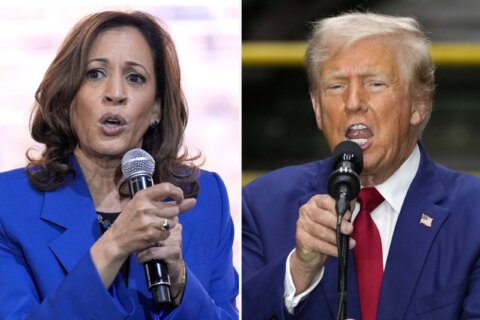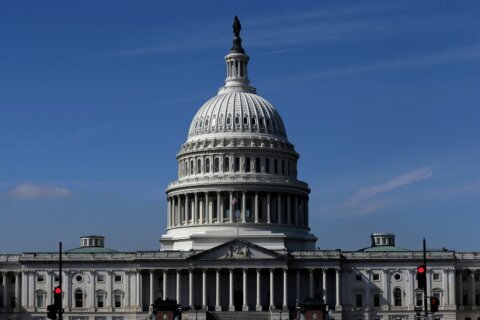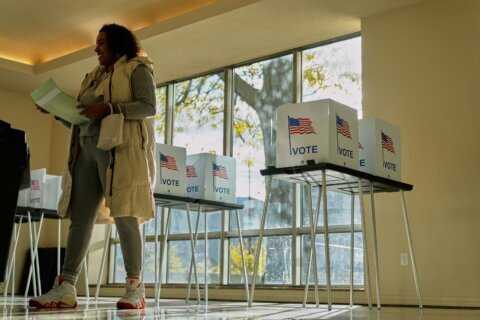Sign up for WTOP’s Election Desk weekly newsletter to stay up-to-date through Election Day 2024 with the latest developments in this historic presidential election cycle.
The Electoral College means presidential campaigns remain focused on just a handful of states that could swing the election in either direction. The states that make up the D.C. region aren’t on that list, meaning the area isn’t really hosting presidential candidates for campaign stops.
If you don’t like the way the Electoral College works, well, it’s unlikely many of the Founding Fathers would, either.
The concept itself is a centuries old practice that started in Europe. But it’s not used anywhere else, and the way it’s used in the U.S. has evolved in a lot of ways it wasn’t intended to.
“It’s hard to justify today based on what they wanted, because it doesn’t work the way they wanted,” said David Karol, associate professor of government and politics at the University of Maryland.
He said the original intent was, in layman’s terms, to elect a bunch of smart people who would then vote for the best candidate. It was a time without political parties, and faith in the independence of electors.
“But no one voting, for the most part, knows who these people are. They’re not exercising any judgment,” said Karol. “That’s not what the founders thought.”
The concept itself was also a bit of a compromise. Some of those involved in the constitutional convention were pushing for a popular vote winner. Others wanted Congress to pick the president, according to Karol. But more wanted some sort of representative-based system, though without letting women, or slaves, have any actual say in the matter.
“The slaves were certainly not going to be given the vote,” Karol said. “The Electoral College gave more influence to states where there were large numbers of enslaved people, because they were counted partially for representation, but then that only meant that the white men with property from those states — their votes had more weight than votes of men in states where there weren’t slaves. So the Electoral College is tied up with slavery, historically.”
That coupled with the emergence of political parties around the time George Washington was serving, quickly eradicated any independence the electors might have.
“They were generally not happy about the rise of political parties, although they participated in it,” Karol said. “In many cases, they tended to say, ‘Well, this is, we’re just doing this because our opponents are doing it and they’re organized, so we have to organize.’”
Is the Electoral College here to stay?
It wasn’t until the early 20th century that every state directly elected U.S. Senators. But Karol thinks bringing that to presidential elections might be too difficult.
“We are so divided on a partisan basis,” he said. “People’s first question is always, ‘Who will this help? Who will this hurt?’”
He said the closest chance for that to happen was more recent than you might think, though.
“It would have to be a case that it wasn’t clear that it helped one party or the other. In 2004, John Kerry, the Democrat, came pretty close to winning the Electoral College while losing the popular vote,” Karol said. “I think, had that happened, had it hurt both parties in a short period of time, there might have been support for abolishing it. But absent that, I don’t think it’s going anywhere.”
According to a September study from the PEW Research Center, 63% of Americans would prefer to decide the presidency by popular vote over the Electoral College. That same study found that 63% of conservative Republicans prefer the current system.
Proponents of the Electoral College, such as The Heritage Foundation, a D.C.-based conservative think tank, have said it gives a voice to America’s rural population, which has different needs than those who live in densely populated cities.
“The Electoral College prevents presidential candidates from winning an election by focusing solely on high-population urban centers and dense media markets, forcing them to seek the support of a larger cross-section of the American electorate. This addresses the Founders’ fears of a ‘tyranny of the majority,’ which has the potential to marginalize sizeable portions of the population, particularly in rural and more remote areas of the country,” the foundation said on its website.
Since 1992, only one Republican presidential candidate has won the popular vote: George W. Bush in 2004.
Get breaking news and daily headlines delivered to your email inbox by signing up here.
© 2024 WTOP. All Rights Reserved. This website is not intended for users located within the European Economic Area.








